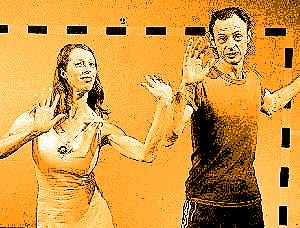Film Review
A delightful and wickedly funny melange of black comedy and slapstick,
Rumba is the second highly
idiosyncratic film from the trio formed by Dominique Abel, Fiona Gordon
and Bruno Romy, a worthy successor to their first film
L'Iceberg (2005). With
some amusing nods to Buster Keaton and Jacques Tati,
Rumba is a treat for aficionados of
visual comedy, consisting of an unbroken stream of slick visual gags,
some with a deliciously dark edge to them. The film has a
distinctive visual style which adds to its charm and quirkiness.
For the most part, the camera is fixed in position, with the actors
moving in and out of the frame as in the early silent comedies - an
approach that works well as it makes the performers the centre of
attention and gives them complete control over the visual humour.
Chaplin would no doubt have approved, as he used the same technique in
virtually all of his films.
Although it takes a somewhat circuitous route to get there, the
moral of
Rumba is
not hard to divine. No matter what horrors life may throw at us - a near
fatal car accident, limb amputation, memory loss, losing your house in
a fire and being robbed of your last
pain
au chocolat - love will always triumph over adversity in the
end. That may sound crushingly trite, yet Abel, Gordon and Romy's
approach is so refreshingly good-natured and eccentric that the film engages our feelings
without displaying the slightest hint of sentimentality.
Dom and Fiona may not be quite so easy on the eye as Fred and Ginger but they
make a dancing couple that is every bit as charismatic and likeable, and their
visual jokes are as perfectly coordinated as their dances.
In a nutshell,
Rumba is a
pure comedy delight - a feel-good film that will enchant anyone who
watches it, particularly old-fashioned romantics and lovers of silent
comedy.
© James Travers 2011
The above content is owned by frenchfilms.org and must not be copied.
Film Synopsis
Teachers at a school in the country, Fiona and Dom are a couple who
share an intense passion for Latin dancing. Their house is filled
with trophies from the dancing tournaments they have won over the
years. They could not be happier - but then disaster
strikes. One night, on their way home from another competition,
they crash their car to avoid running over a suicidal man. When
they come to in hospital, Fiona has lost one of her legs and Dom has
lost his memory. Through a series of mishaps, they then lose
their jobs and their home. Then, worst of all, they lose each
other...
© James Travers
The above content is owned by frenchfilms.org and must not be copied.



